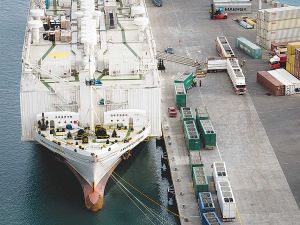Editorial: Happy days
OPINION: The year has started positively for New Zealand dairy farmers and things are likely to get better.
 Some 40,000 cattle have been exported this year with another 28,000 planned to go in the months ahead.
Some 40,000 cattle have been exported this year with another 28,000 planned to go in the months ahead.
OPINION: The decision by Ministry for Primary Industries (MPI) to impose an immediate halt to live animal exports in the wake the sinking of the Gulf Livestock 1 off the coast of Japan is a sensible move.
One would hope this is properly used as a pragmatic opportunity to review what exactly happened in this tragic case. It should not be used as some covert move to end this valuable export trade to appease overly excited animal activists and get this issue off the political agenda.
The ship left Napier on August with 43 crew including two New Zealanders and 6000 cattle bound for China. As Rural News went to press, still only two survivors and one dead crew member from the ship had been found. Let’s not forget, 40 people are still missing.
MPI says it wants to be assured that before there are any decisions about another shipment that it knows what took place on the Gulf Livestock 1 in more detail. That is not only sensible, but the right thing to. The sinking of the ship and the loss of the crew is tragic.
But this shouldn’t be used as some underhand tactic to end the trade of live animals for export. It is a lucrative, safe and important market for NZ.
Claims about high death rates and terrible conditions on board made by animal activists are not borne out by the facts. The cattle on these ships are well looked after on their voyage, fed high-quality feed and given veterinary supervision. The mortality rate is around 0.1%, which is no higher than the death rate if they stayed in NZ. These cattle are sent for breeding purposes, not slaughter and would most likely have been killed as bobby calves in NZ if they had not been sent for export.
This year alone, some 40,000 cattle have been exported with another 28,000 planned to go in the months ahead. The price of $1,400 a heifer is almost double what the same beast would make in NZ.
Yes, we need to ensure that any live exports from NZ meet the highest animal welfare and human safety conditions.
However, we must not allow the emotion of this tragic event or political activism over-rule a lawful, ethical, safe and financially viable option for the NZ livestock sector.
The World Wide Sires National All Day Breeds Best Youth Camp Best All Rounder plaudit has become family affair, with 2026 Paramount Cup winner Holly Williams following in her sister Zara's footsteps.
DairyNZ is giving New Zealand farmers a unique opportunity to gain hands-on governance and leadership experience within the dairy sector.
Herd improvement company LIC has posted a 5.2% lift in half-year revenue, thanks to increasing demand for genetics.
According to the latest Fresh Produce Trend Report from United Fresh, 2026 will be a year where fruit and vegetables are shaped by cost pressures, rapid digital adoption, and a renewed focus on wellbeing at home.
The Roar is a highlight of the game hunting calendar in New Zealand, with thousands of hunters set to head for the hills to hunt male stags during March and April.
OPINION: The past few weeks have been tough on farms across the North Island: floods and storms have caused damage and disruption to families and businesses.